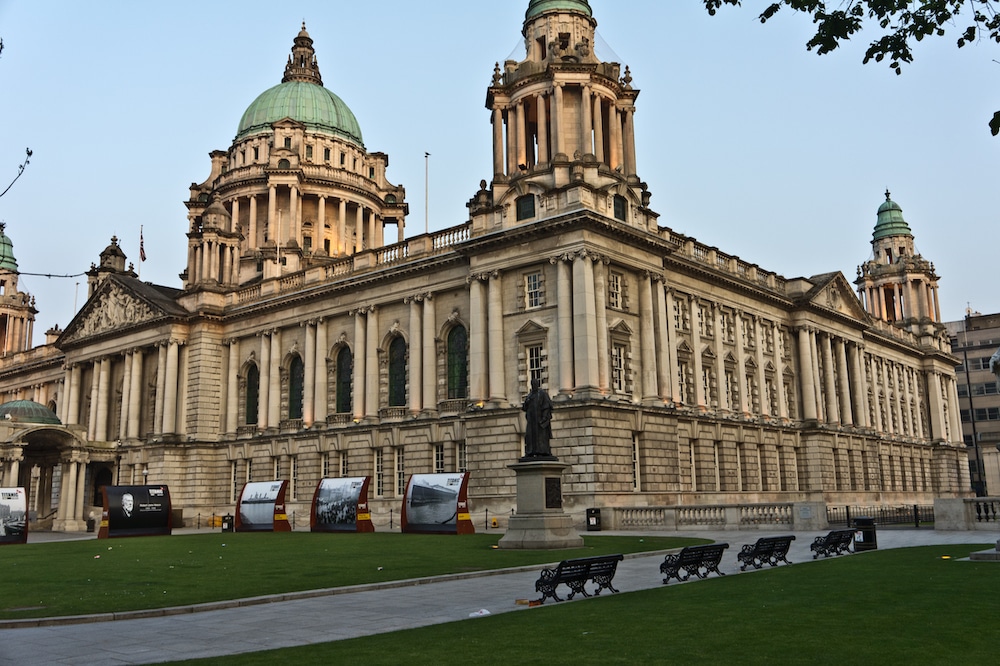
A last ditch attempt by unionists to reverse a Belfast council decision to change policy on bilingual streets signs in the city has failed.
At this week’s meeting of the full council, elected members voted conclusively for new criteria regarding the erection of a second street nameplate in a language other than English. The majority of street signs in a second language in the city are in Irish, and the majority of applications are for Irish signs.
The new policy means at least one resident of any Belfast street, or a councillor, is all that is required to trigger a consultation on a second nameplate, with 15 percent in favour being sufficient to erect the sign. Up until now, the policy required 33 percent of the eligible electorate in any Belfast street to sign a petition to begin the process.
Last October, after months of wrangling between Sinn Fein and the Alliance Party on the matter, the two parties came to an agreement on a new policy. At the council’s Strategic Policy and Resources committee 14 out of 20 councillors agreed to the new criteria.
Sinn Fein, Alliance, the SDLP, the Green Party, and the People Before Profit Party all support the new street sign policy, while the three unionist parties, the DUP, UUP and PUP, are all against it.
Despite facing superior numbers in terms of the vote, the DUP used the “call-in” mechanism to delay the council ratification on “both procedural and adverse community impact grounds.”
Last month Belfast council’s city lawyer said the call-in “did not have merit on either ground.” The committee report states: “the policy, when drafted, would be subject to equality screening and consultation and the operation of residual discretion would allow for appropriate consideration of any potentially sensitive decisions.”
DUP Councillor David Brooks again at Thursday’s council meeting tried to delay the new policy, with an amendment to bring back the decision to committee. 39 councillors voted against this, 19 for – so the new policy was passed.
DUP Alderman Brian Kingston said: “It comes as no surprise that nationalist parties are cock-a-hoop at what was passed at committee.”
He added: “There is a political imperative on those parties in this council which claim not to be politically aligned on the constitutional position. Specifically I mean the Alliance Party and the Green Party to prevent nationalist parties dominating this council.”
He said: “Some people regard the addition of an Irish street sign as cultural branding of their area. People have the right to have their wishes against this respected and not ignored. For all those passionate about having a street name added in Irish, there are as many people who are passionate about not having that done against their wishes.
“We believe these changes will damage community relations in areas which are quietly mixed. This unbalanced policy will cause disharmony and resentment.
“Parties are saying they would not ignore the wishes of 85 percent of residents who are objecting – that demonstrates the policy has been rushed through and needs to be looked at again. The rights of those people need to be protected in legislation, not just at the whim of non-unionist parties.
“We are deeply disappointed that our call-in on this decision on the grounds of adverse community impact and procedure was rejected by legal opinion. This unbalanced policy will be cited as an argument against the devolution of further powers to local government, particularly given that the call-in process has once again provided no protection for the unionist community.”
PUP Councillor John Kyle said: “Context is everything. In this context, the Irish language has been politicised, it has become synonymous with anti-Britishness, and I think that poses a real problem when we are considering a process in which only 15 percent of residents in the street support the erection of Irish language signs.”
He added: “What we are proposing here is disproportionate, and I think it is unfair. It amounts to cultural hegemony, to use a good marxist term. The Irish language has become identified with republicanism, and that is a problem in certain areas of our city. For some unionists, it is Irish culture being forced on them.”
SDLP Councillor Carl Whyte said: “If John Kyle knew the first thing about the Irish language he would know that the revival of the language was led by the protestant community and unionist community a long time ago.
“The chain you are wearing Lord Mayor has Irish written on it, and your predecessors have been wearing it for decades. There wasn’t a republican or nationalist wearing that chain until 1998.
“The Irish language was first taught in Belfast in Inst, it wasn’t taught in any catholic schools. There is only one grammar school that has a motto in the Irish language – it is not a catholic school, or a school that nationalists or republicans traditionally go to.”
He added: “I think Councillor Brooks and Councillor Kyle should look around the UK to the rights of Welsh speakers, Scots speakers and Scots gaelic speakers. The entire government of Wales – this is a part of the UK which voted for Brexit and is not a republican stronghold – works on a bilingual framework.
“To have to sit through this tonight as someone who speaks Irish, some who learns Irish, whose aunts and uncles speak it, whose parents speak it, whose child will speak it, is frankly just despicable. I am sick of listening to it. It angers people in this city that in 2020 we still have to sit through misinformation and nonsense like this.”


